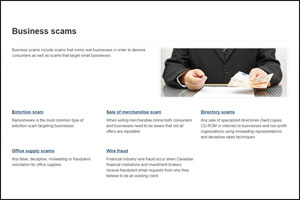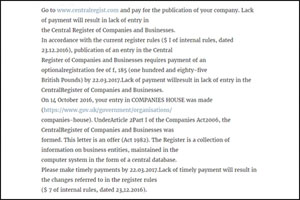Business Scams


Individuals should exercise maximum caution before depositing money to third parties or unknown sources. Here are some key points to consider before making any payments:
-
Verify the legitimacy of the companies offering outsourcing or business opportunities. Conduct independent research to confirm if they are genuine.
-
Cross-check with colleagues or friends to see if they’ve also received similar emails. Scammers often target large groups with identical messages.
-
Use the provided contact details to reach out directly to the company. Call the phone number or visit the address mentioned in the email to verify authenticity.
-
Avoid depositing money immediately. Treat payment as a last resort. If you must deposit, start with a nominal amount instead of a large sum.
-
Check if the company is blacklisted. Look into whether the business offering such projects is flagged by any government or consumer protection agency.
-
Report suspicious companies. If you suspect fraud, escalate the issue to the police, cybercrime unit, or other relevant authorities.

Phishing Emails – Thieves send counterfeit emails that seem to be from trustworthy sources like banks, government offices, or familiar organizations, and ask the recipients to provide login information, financial information, or personal data.
CEO Fraud / Business Email Compromise (BEC) – Thieves pose as top executives of a business to ask employees to send unauthorized wire transfers or sensitive company information.
Tech Support Scams – Con artists impersonate tech support personnel and dupe victims into allowing remote access to their systems, from which they steal information or bill for unwanted services.
Directory Listing Scams – Scammers send bills for business directory listings or ad services not ordered by businesses, trying to trick businesses into paying for phony charges.
Invoice Fraud – Thieves intercept or forge invoices, altering bank information to redirect payments into their accounts.
Loan or Grant Scams – Phony business loan or grant offers are made with the promise of loans or grants in exchange for up-front fees or personal information, never delivering the funds.
Pyramid Schemes – People are recruited into programs that depend on recruiting others to invest. New recruits fund payments to previous investors, rendering the system financially unsustainable.
Fraudulent Business Opportunities – Scammers provide overblown or fabricated business opportunities, requiring initial investment or franchise payments, which eventually lead to financial loss.
Fake Check Scams – Victims receive counterfeit checks for goods or services and are requested to send back part of the money. After the check is returned, the victim is responsible for the entire sum.
Phony Investment Opportunities – Scammers sell false or worthless investment opportunities with guaranteed high returns. The victims lose cash when the investments are nonexistent or useless.
Business Identity Theft – Swindlers hijack a company's identity to establish credit accounts, obtain loans, or engage in fraud, usually without the business owner's knowledge.
Home Improvement or Contractor Scams – Crooked contractors take payments upfront to make repairs or improvements and either leave the job undone or produce below-standard work.





